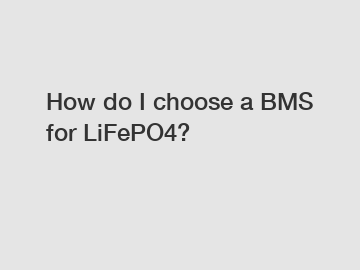How do I choose a BMS for LiFePO4?
When it comes to choosing a Battery Management System (BMS) for your LiFePO4 battery pack, there are several factors to consider in order to ensure optimal performance, safety, and longevity. LiFePO4 batteries are known for their high energy density, long cycle life, and stability, making them a popular choice for a wide range of applications from electric vehicles to renewable energy storage systems. However, in order to get the most out of your LiFePO4 batteries, it's essential to select the right BMS for your specific needs. In this blog post, we will discuss the key considerations to keep in mind when choosing a BMS for LiFePO4 batteries.
First and foremost, it's important to understand the role of a BMS in a battery system. A BMS is responsible for monitoring and managing the performance of individual cells within a battery pack, as well as protecting the cells from overcharging, overdischarging, and overheating. Without a BMS, a LiFePO4 battery pack is at risk of damage, reduced efficiency, and safety hazards. Therefore, selecting a high-quality BMS is crucial to the overall performance and safety of your battery system.
One of the most important factors to consider when choosing a BMS for LiFePO4 batteries is the voltage and current rating of the BMS. LiFePO4 batteries typically have a nominal voltage of 3.2V per cell, so it's important to select a BMS that is compatible with this voltage range. Additionally, the BMS should be able to handle the maximum current output of your battery pack in order to prevent overheating and damage to the cells. It's recommended to choose a BMS with a slightly higher current rating than the maximum output of your battery pack to ensure safe and reliable operation.

Another important consideration when choosing a BMS for LiFePO4 batteries is the number of cells in your battery pack. The BMS must be able to monitor and balance the performance of all the cells in the pack in order to maintain optimal performance and prevent premature aging of the cells. Therefore, it's essential to select a BMS that is designed for the specific configuration of your battery pack, whether it's a series, parallel, or series-parallel connection.
In addition to voltage and current ratings, it's important to consider the features and capabilities of the BMS. Some advanced BMS systems offer features such as cell balancing, temperature monitoring, communication interfaces, and overcurrent protection. These additional features can help to optimize the performance and safety of your battery system, so it's worth investing in a BMS with a comprehensive set of features.
When choosing a BMS for LiFePO4 batteries, it's also important to consider the quality and reputation of the manufacturer. Look for reputable manufacturers with a track record of producing high-quality BMS systems that have been independently tested and certified. It's worth spending a bit more money on a BMS from a trusted manufacturer to ensure the reliability and safety of your battery system in the long run.
Lastly, don't forget to consider the installation and compatibility of the BMS with your existing battery system. Some BMS systems may require additional wiring, sensors, or programming in order to integrate with your battery pack. Make sure to carefully read the installation instructions and requirements of the BMS before making a purchase to avoid any compatibility issues.
In conclusion, choosing the right BMS for LiFePO4 batteries is crucial to the overall performance, safety, and longevity of your battery system. By considering factors such as voltage and current ratings, the number of cells in your pack, features and capabilities, manufacturer reputation, and compatibility, you can ensure that you select a BMS that meets your specific needs and requirements. Investing in a high-quality BMS will not only help to maximize the performance of your LiFePO4 batteries but also provide peace of mind knowing that your battery system is safe and reliable.
For more information, please visit difference between car batteries, battery type flooded means, agm battery vs flooded.

Comments